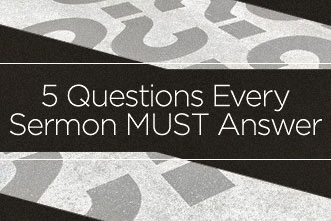So, you’ve done your research, filed the reports and you’re ready to zip into the pulpit and sock it to ’em. You’ve done the hard work, and you’re excited—you know your congregation will be psyched.
But there’s only one problem: They’re not psyched.
Step into the pulpit Sunday morning, and so far, the only person in the room who cares about your sermon is … you. As jacked as we are about the Greek syntax, historical jewels and hidden biblical connections during the week, we still have work ahead of us: We need to make the congregation care as much as we do.
Surprising as it may seem, 99 percent of the folks who come to church on Sunday don’t care about 99 percent of what we found in our study. Make that 100 percent for non-Christians.
If we prepare with eight hours of hard research, and only use one hour to make it approachable, it will have all gone to waste. That’s like trying to lose weight by spending an hour a day in the gym, then eating Twinkies and drinking Mountain Dew for the rest of the week—you did the hard work, but you didn’t do the easy work that made it effective!
So, before you step into the pulpit, you need to work backward.
What does the congregation care about? And how can you bridge the gap between their day-in and day-out valleys and the mountain tops of biblical exegesis?
Answer the following five questions from your listeners, and you’ll have done your job (actually, answering these questions in order is a great sermon structure in and of itself):
1. Who are you?
Unless you essentially plan on having no guests breach your doors, you need to start thinking about how a sermon sounds from the outside.
Remember, we live in a world with a natural distaste for authority—pastors are generally seen as nonhuman entities with a chip on their shoulder. So, before you say anything, tell them who you are.
I like to start with a story about myself, prove that I’m human and have problems, and move from there.
2. What’s wrong?
I love the way Bryan Chapell frames this in his book, Christ Centered Preaching: What’s the Fallen Condition Focus (FCF) of your passage? Every passage of scripture is addressing our fallen condition on some level. And, on some level, we all feel and experience that condition in our daily life.
So—what does it sound and feel like to live with your passage’s particular FCF, both for the “religious” crowd (I’m trying to earn God’s favor) and the “secular” crowd (I’m skeptical of religion)? If you can, use religious and secular resources to articulate how the problem expresses itself in daily life before you even touch your text (think Paul on Mars Hill).
There’s no point in stepping into exegesis until you’ve answered this question—we don’t care yet.












